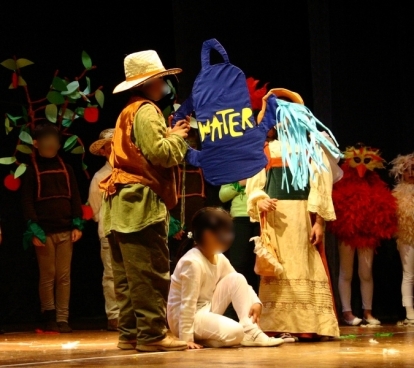The Enormous Turnip is a super simple story for children learning English as a second language and useful for introducing or revising family and animal vocabulary. An alternative to reading directly from a book is to use picture cards and adapt the language according to the children’s language abilities
Storytelling using theatre props and costumes add extra elements of curiosity, facilitate comprehension and encourage group participation.
To accompany The Enormous Turnip try making a little paper shovel, an envelope full of seeds (rice) and a paper watering can. Include simple coloured masks and stick to plastic spoons for the children to hold for role play work.
You can create a mini role play by simply using props similar to the ones I use in the video and involve children by asking them to sow and water the seeds. Add to the fun by encouraging children to interpret the story characters . Give them a mask and tell them in turn to pull the “flashcard”!

http://www.teatroinglese.it The Enormous Turnip end of year production
I also find a great exercise after I have told the story is get the children to act it out!
1. Play some relaxing instrumental music for the children to listen to
2. Encorauge the children to lie on the floor and make themselves as small as possible
3. Explain that you are the farmer and using the shovel, pretend to dig holes around the children
4. Sow the seeds (by shaking the envelope of rice over the children’s heads)
5. Water the seeds (make some whooshing water sounds over the children’s bodies)
6. Encourage the children to imagine they are the tiny turnip seeds growing slowly under the earth
7. Continue watering the “seeds” and then explain to the children that the sun is coming out and becomes warmer and slowly the seeds begin to grow, bigger and bigger and bigger until they become the most ENORMOUS TURNIPS waiting to be pulled out of the earth by the farmer (play act with the children and show examples of how they can express the growing seeds using their bodies and faces )
Great fun and a theatrical way to review key vocabulary.
Miranda Flynn Legge
